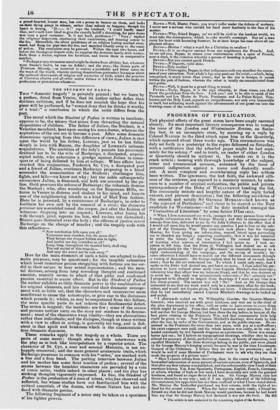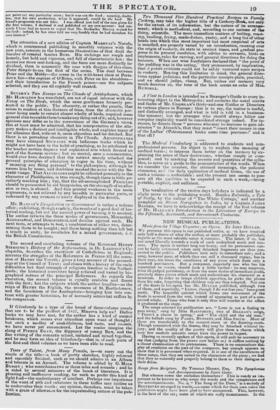PROGRESS OF PUBLICATION.
" When I first commenced my work, amongst the many persons from whom I sought infortnation was Sir George Murray ; and this in consequence of a message from him, delivered to me by Sir John Colborne, to the effect that if I would call upon him he would answer any question 1 put to him on the sub- ject of the Peninsula War. The interview took place ; but Sir George Murray, far from giving me informatiou, seemed intent upon persuading
me to abandon my design ; repeating continually, that it was his intention to write the history of the war himself. He seemed also desirous
of learning what sources of information I had access to. I took oc-
casion to tell him, that the Duke of Wellington had desired me to ask him. particularly for the Order of Movements.' as essentially necessary to a
right understanding of the campaign, and the saving of trouble ; be- cause otherwise I should have to search out the different movements through a variety of documents. Sir George replied, that he knew of no such docu- ment ; that he did not understand me. To which I could only reply, that I spoke as the Duke had desired me, and knew no more. I then asked his per- mission to have reduced plans made from Captain Mitchel's fine drawings ;. informing him that officer was my intimate friend, and that he was desirous so to assist me. His reply was uncourteously vehement—' No ! certainly not !' I proposed to be allowed to inspect those drawings if I were at any time at a loss about ground. The answer was still No ! ' And as Sir George then intimated to me that my work could only be a momentary affair for the book- sellers, and would not require plans, I took my leave. I afterwards discovered that he had immediately caused Captain Mitchel's drawings to be locked up and sealed.
" I afterwards waited on Sir Willoughby Gordon, the Quarter-Master- General ; who received me with great kindness, and sent me to the chief of the plan department in his office, with an order to have access to every thing which might be useful. From that officer I received every attention ; but he told me that Sir George Murray had been there the day before, to borrow all the best plans relating to the Peninsula War, and that consequently little help could be given to me. Now Captain Mitchell's drawings were made by him after the war, by order of the Government, and at the public expense. He re- mained in the Peninsula for more than two years, with pay as a staff-officer ; his extra expenses were paid, and the whole mission was costly, as he was at- tended constantly by two Spanish dragoons as a protection. Never was money better laid out ; for I believe no topographical drawings, whether they be con- sidered for accuracy of detail, perfection of manner, or beauty of execution, ever equalled Mitchel's. But those drawings belong to the public, and were placed in Sir George Murray's keeping merely because he was at the time Lieutenant- General of the Ordnance. I believe they arc still in his possession ; and it would be well if some Member of Parliament were to ask why they are thus made the property of a private man? " Here I cannot refrain from observing, that, in the course of my labours, I have asked information of many persons of various nations, even of Spaniards, and that after nay first volume was published, and the unfavourable view I took of their exertions known. Yet, from Spaniards, Portuguese, English, French, Germans, or others, whether of high or low rank, I have invariably met with the greatest kindness, and found an eager desire to aid me. Sir George Murray only has thrown obstacles in my way ; and, if I ant rightly informed of the following circumstances, his opposition has not been confined to what I have stated above. Mr. Murray the bookseller purchased my first volume, with the right of re- fusal for the second volume. When the latter was nearly ready, a friend in- formed me that he did not think Murray would purchase, because he had heard him say that Sir George Murray had declared it was not the book. He did
• The article is now embodied ia the ramaiuing copies of the Review.
Tisk physical effects of the great storm have been amply narrated already. Its most important literary consequence was to compel the issue of the London and Westminster Review, on Satur- day last, in an incomplete state, by snowing up a reply by Colonel NAPIER to the third attack upon hint in the Quarterly, which appeared about three weeks ago. This circumstance was duly set forth in a postscript to the copies delivered on Saturday, with a notification that the retarded paper might be had sepa- rately for the asking :* and in truth, no reader of either London or Quarterly should be without it. In vivida vie it is the crack article ; teeming with thorough knowledge of the subject, bitter and unmeasured sarcasm, animated by the furor of personal indignation against a mean and dastardly assail- ant. A more complete and overwhelming reply has seldom been written. The ignorance, the bad faith, the awkward silli- ness of the reviewer, are exposed in a masterly manner, by refer- ence to a number of original authorities, the public and private correspondence of the Duke of WELLINGTON heading the list. The necessarily minute and lengthy nature of the reply forbid extract, and prevent description ; but the following anecdotes of the smooth and saintly Sir GEORGE MURRAY—last known as " the rejected of Perthshire," and about to be started as the Tory candidate for Westminster—will be duly installed amongst the " Curiosities of Literature" by some future D'IsaAELI. not point out any particular error ; but it was not the book ; meaning, doubt- less, that his own production, when it appeared, would be the book My friend's prognostic was not false. I waa offered just half of the sum given for the first volume. I declined it and published on my own account: and cer- tainly I have had no reason to regret that Mr. Bookseller Murray waited for the book : indeed, he has since told me very frankly that he bud mistaken his own interest."































 Previous page
Previous page